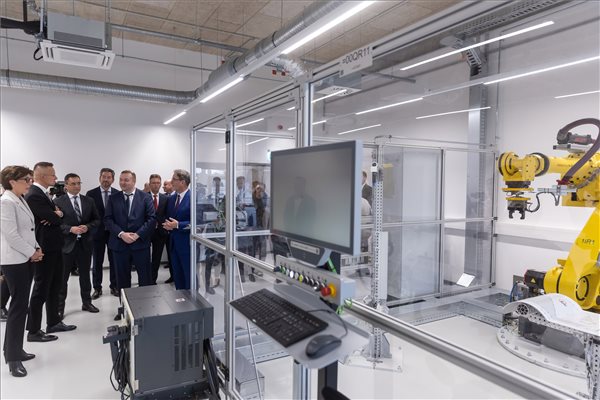Hungary’s example proves that economic cooperation between East and West is not only possible, but also legal due to interdependence, and moreover, it has extremely positive effects, Minister of Foreign Affairs and Trade Péter Szijjártó said on Monday in Debrecen.
According to the announcement of the Ministry of Foreign Affairs and Trade, the head of the department reported at the dedication ceremony of the BMW training center that the first hundred students who started their three-year studies in September, current and future employees of the German company’s factory in Debrecen, will learn to use the most modern technologies available.
He emphasized that it is a sign of the highest degree of trust in the Hungarian people that BMW is installing the new, currently non-existent, exclusively electric platform production in our country. And the cooperation between BMW, the government and Debrecen will ensure that the workforce is always available in sufficient numbers.
“The government provided HUF 25 billion to the university to expand the capacities of the technical engineering faculty and to establish a new vehicle technology research institute. As we heard from the mayor, they now work together with more than 12,000 students in the vocational training center,” he said.
“Thanks to the young people studying here, the general competitiveness of Hungary will also increase significantly, which is of particular importance in the current period, when there is an amazingly sharp fight for investments in the world,” he emphasized.
Péter Szijjártó reported that the last one to one and a half decades was a period of crises, and the world economy turned upside down twice in recent years, but there is a process that nothing could stop: the electric transition of the automotive industry.
“Which country will be among the winners or losers of the new era basically depends on how which country can join the global automotive revolution, which country can take its share of the new automotive era,” he declared.
“Well, I think, without any pomposity or exaggeration, based on the facts alone, we can safely say that Hungary has become the European champion of this electric automotive transformation, and we are among the leaders in the world,” he added.
He then stated that this is due to the fact that Western and Eastern, and primarily German and Chinese companies have found the possibility of peaceful cooperation in Hungary.
“Of course, this stems from the lowest taxes in Europe, it stems from the most competitive European investment environment, but it also stems at least as much from the foreign policy strategy based on mutual respect, thanks to which today Hungary can build and maintain civilized relations both east and west,” he said.
The minister called BMW’s investment in Debrecen an important milestone, since all three German premium car brands will now have a factory in Hungary. In addition, according to his words, this also induced huge Chinese investments, as evidenced by the fact that now five of the world’s ten largest Eastern battery manufacturers have committed themselves to our country.
“So we have shown that East-West economic cooperation is not only possible, but due to the interdependence, it is also legal and has extremely positive effects, for example, jobs are created en masse, the most modern technology is used,” he listed.
“That is why the Hungarian government opposes any effort (.) aimed at cutting off this completely natural east-west division of labor with some artificial means, for political or ideological reasons,” he warned.
Finally, he emphasized that the electric transition of the automotive industry has already been decided, and without it it would be impossible to meet the climate goals, since road transport accounts for roughly 14 percent of emissions.
“So the automobile industry will be electric. The investments necessary for this have already been made in part, and are being made continuously, as here in Debrecen. Some factories have already been built, and some will be built,” he said. “The question is not this. The question is where all this will take place. Where will these investments, these factories create jobs? Where will they create new development resources?” – he added.
He also touched on the fact that the production value of the domestic automotive industry exceeded HUF 10,000 billion for the first time last year, behind which there is a balanced and stable growth, as evidenced by the fact that in the first eight months of this year another 20 percent expansion was registered.
(MTI)
Main picture: Ilka Horstmeier, board member of BMW AG, Péter Szijjártó Minister of Foreign Affairs and Trade, Mayor László Papp, Barabás Botond, Head of Training at BMW Manufacturing Hungary and Hans-Peter Kemser, President and CEO of BMW Hungary Manufacturing (b-j) at the inauguration of BMW’s training center in Debrecen on October 30, 2023. MTI/István Derencsényi


















